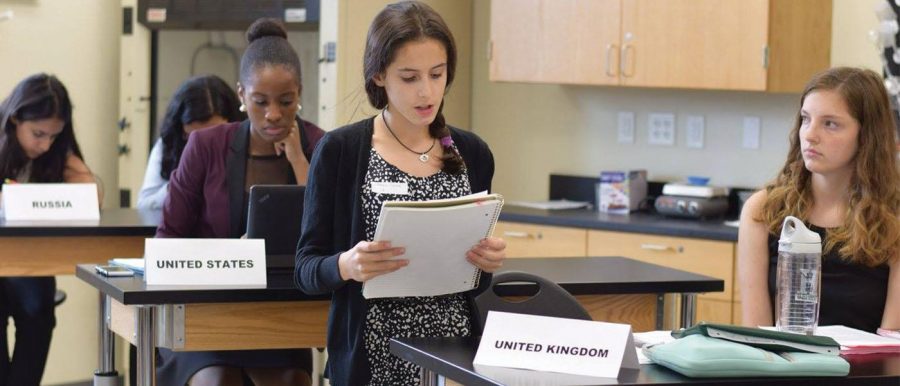Women fill 40 percent of jobs in management. Twenty-five percent in mathematics and computer sciences. Less than 10 in engineering. Given this trend, it may not surprise you to hear that women make up less than 25 percent of foreign policy positions. But, then again, maybe it will. In recent years, questions have arisen about gender disparities in STEM-related fields. “Where are the women?” Forbes contributor Heather R. Huhman said in a 2012 article. “No matter where you turn, the stats are grim.”
Huhman was specifically referencing the lack of women in STEM-fields, but her statement tackles a universal problem: men dominate the majority of all fields, including those involving foreign policy, international relations and international business.
So, even though gender disparities exist in both STEM and foreign policy-related occupations, why does one get more attention than the other?
On Feb. 8, Upper School history teacher Tracy Walder presented at the National Coalition for Girls’ School annual conference. In her presentation, Walder spoke about the importance of inspiring girls to pursue careers in foreign affairs.
“Globalization is here, and world economies are intertwined like never before,” Walder said in her speech. “As a result, American foreign policy decisions have long-lasting consequences, and the people making those decisions will not live long enough to experience the full effects of them; however, the girls we teach will.”
Walder, who teaches AP Comparative Government as well as her self-designed course Spycraft: Espionage and Diplomatic Policy, believes in the importance of bridging not only the knowledge gap that exists among teens and global affairs, but also the gender gap between women and careers in foreign policy.
Utilizing techniques learned from her tenure at the Central Intelligence Agency counter-terrorism center and from her time as a Special Agent with the Federal Bureau of Investigation in the early 2000s, Walder provides a different approach to learning about foreign policy that is unparalleled by any other high school education.
“It’s from my understanding that no school in the U.S. offers something like this,” Walder said.
In both classes, Walder uses several different mediums as a means of presenting information. Students in both classes are required to post or retweet news articles that are relevant to class discussions on the class Twitter feed. These tweets are then utilized during the first 10 minutes of class, which is dedicated to talking about current events.
Senior Camila Trejo is currently enrolled in Walder’s AP Comparative Government course.
“[The Twitter feed] is really cool because you get to learn what’s actively going on. It keeps the class really engaged,” she said. “It’s my favorite class by far that I’ve ever taken at Hockaday.”
In addition to Walder’s history electives, clubs such as Model United Nations and Junior World Affairs Council exist to satisfy students’ interest in foreign affairs.
Trejo, who has participated in Model U.N. and JWAC since her freshman year, now acts as the secretary-general and president of both clubs.
“In Model U.N. I was really able to delve deeper into certain issues that I hadn’t thought of before, like drone strikes and international drug trade,” Trejo said. But, even with these opportunities, Walder and Trejo believe that there needs to be more focus on foreign affairs in terms of education.
“There aren’t enough assemblies about it. There are only two classes about it,” Trejo said. “It’s not ingrained enough into our curriculum or into our daily lives.”
With the advent of the “Join the (Inter)National Conversation” series started by the Convocations Board this year, however, Hockaday is beginning to provide facts on global issues to all students rather than the select few.
Senior and 2015-2016 Convocations Board Chair Rajya Alturi said that the series originated in response to how social media is used by students to share opinions.
“We wanted to have the educational material behind it and not just opinions,” Alturi said. “That’s really empowering because people are able to discover their own opinions on these topics. To have your own opinion about topics is really important.”
In previous years, the Convocations Board has invited speakers from outside of the community to speak on various issues. This year, however, faculty members within Hockaday were chosen to speak.
“We have a lot of talent within our faculty to speak on issues that we want to hear about,” Atluri said.
Walder spoke about the threat of ISIS at the first assembly in the fall. Due to the positive response from both students and faculty, the Convocations Board decided to continue the series, by adding two more assemblies.
The most recent assembly occurred on April 12, in which Upper School science teacher Kirsten Lindsey-Husak spoke about genetically-modified organisms.
The Convocations Board plans to continue this series in the upcoming 2016-2017 school year.
“Whether you’re an engineer or an English major, the world is a global place. So if you don’t understand how other countries are dealing with each other, I’m not sure how you’re going to be successful in any career,” Walder said. “I think to offer [a global education] to all girls is empowering.”
– Erin Thomas – Editor-in-Chief













